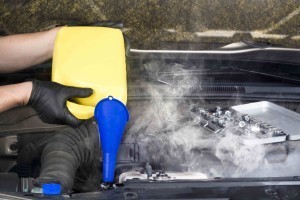INDEPENDENT DEALER
Mission, TX | (956) 458-9399
Oils RGV
OUR BLOG
05/15/2023
An overheated engine can damage your car beyond repair. For tips on preventing and dealing with extreme heat under the hood, read this post by Oils RGV in Mission.

Your engine is like the heart of your vehicle, so you must protect it from overheating. Extreme heat under the hood can cause severe mechanical damage if left untreated. As such, this post will explain what an overheating engine is, how to prevent it, and more. If you are interested, read on!
Want to provide your vehicle with superior engine protection? Feed it with top-quality formulas like AMSOIL's Signature Series 5W-20 Synthetic Motor Oil. To place an order for this and other advanced oils, stop by AMSOIL's online store or call Oils RGV in Mission at (956) 458-9399 anytime.
Main Causes of an Overheated Engine
Understanding the main causes of engine overheating is vital for preventing this issue. Of course, there are many reasons why the temperature under the hood rises. Some problems require simple repairs, while others can be more complex and costly. In any case, beware of these common causes:
Malfunctioning Thermostat
The thermostat is a crucial component of the cooling system. Its primary function is to restrict the coolant's flow toward the radiator. It acts as a valve that opens when the temperature of the coolant exceeds the engine operating temperature. If the thermostat gets stuck in the closed position, the coolant cannot flow toward the radiator to cool down. As a result, the coolant overheats quickly, and so does the machine.
Low Coolant Level
Coolant is a mixture of water and antifreeze that helps to keep the engine at the right temperature. If the coolant level is low, the machine can overheat and develop irreversible damage. Given the gravity of such a risk, check and top the coolant level off as needed.
Faulty Water Pump
A malfunctioning water pump is another common cause of engine overheating. This pumping device pushes the coolant around the engine cylinder. When it fails, the coolant cannot flow as it should, leading to overheating and other problems. Therefore, a faulty water pump must be replaced by a professional mechanic as soon as possible.
Keep your vehicle running smoothly by giving it the top synthetic oil change in Mission. Call Oils RGV at (956) 458-9399 to get acquainted with the best oils for your rig. Or, visit AMSOIL's online store to find the best car care products.
How to Deal with an Overheated Engine
Dealing with an overheated car can be stressful, especially if you don't know how to react or what to do. Follow these steps to safely and effectively handle this hazard:
- If your engine is overheating, you should pull over to a safe location as soon as possible. Turn off the engine and let it cool down for at least 30 minutes.
- Once the engine has cooled down, open the hood and check the coolant level in the radiator. If the fluid level is low, add more coolant to the radiator. If you don't have any coolant on hand, top it off with water.
- Look for any signs of coolant leaking from the radiator or hoses. Immediately take your car to a certified shop if you see a leak.
- Make sure the radiator fan is working correctly. You must take it to your trusted mechanic for repair if it's not working.
- Check the serpentine belt. If the belt is loose or broken, the water pump won't function properly, causing the engine to overheat.
- After adding coolant and checking for leaks, start the engine and drive slowly. Monitor the temperature gauge and watch for any warning signs of further engine damage.
- Take your car to a mechanic immediately. Neglecting an overheated engine could cause very costly and even irreversible damage.
How to Prevent Engine Overheating
There are several things you can do to prevent your engine from overheating. Here are some tips to keep your vehicle cool and running smoothly:
- Check your coolant level at least once a month or before any long drives.
- Another way to prevent anoverheated engineis to regularly check your radiator for any signs of damage or leaks. If you notice any issues, have your radiator inspected by a professional.
- Ensure your engine's cooling system works properly. This includes the water pump, thermostat, and radiator fan. If any of these components are faulty, your engine may overheat. So, check your owner's manual for recommended maintenance intervals for these components, and have them inspected as needed.
- Finally, be mindful of how you drive your vehicle. Aggressive driving can stress your engine and cause it to overheat. So, be sure to drive your car in a manner that is appropriate for the road conditions and obey all traffic laws.
Ensure a safer driving experience by feeding your car with the top synthetic oil in Mission. For advice on what oils and products match your vehicle's maintenance needs, get in touch with the oil pros at Oils RGV at (956) 458-9399. To explore the full range of AMSOIL products, visit our online store today!
CONTACT